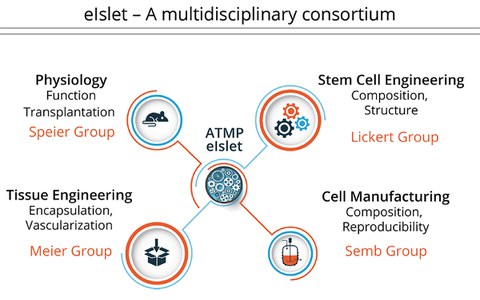May 18, 2020
eISLET wins a pilot innovation competition award by BMBF
A collaboration of three institutes of the Helmholtz Diabetes Center is among the first winners of the three pilot innovation competitions for the promotion of the development of disruptive innovations of particular technological and social relevance. The competition “Organ replacement from the laboratory “dealt with the urgent question of how almost 10,000 seriously sick patients in Germany who are waiting for a life-saving transplant can be helped in the long term.
Four research groups of the Helmholtz Zentrum München, including its satellite institute in Dresden (PLID), are among the winners of the pilot innovation competition for the promotion of disruptive innovations by the Federal Ministry of Education and Research (BMBF). The aim is to support the development of innovations of particular technological and social relevance.
In juvenile type 1 diabetes, the beta cells are mistakenly attacked and destroyed by the patient's own immune system. This is known as autoimmunity. The formerly fatal disease is nowadays treated by injecting insulin as needed. Type 1 diabetes can be cured by clinical islet cell transplantation. Although this therapy has been established for 20 years and is considered very safe, there are two major hurdles: the suppression of the immune system to prevent rejection of the transplanted material and the lack of donor material available for islet cell transplantation. Within the eISLET project, four institutes of the HMGU with different expertise are working together in order to create functional islets for transplantation.
eISLET is a collaboration among the Institute of Diabetes and Regeneration Research (Prof. Heiko Lickert), the Bioengineering and Microfluidics group at the Helmholtz Pioneer Campus (Dr. Matthias Meier), the Institute for Translational Stem Cell Research (Prof. Henrik Semb), and the Islet Physiology group of the Institute for Pancreatic Islet Research at the Paul Langerhans Institute Dresden (Prof. Stephan Speier).
In the next three years, the researchers will be able to invest 1 Mio. Euro into projects that aim to produce alpha and beta cells, essential for the formation of fully functional islets in the pancreas, from inducible pluripotent stem cells (iPSC). The idea is to reproduce the Langerhans' islets of the body both cell-biologically and physiologically and to achieve a function comparable to that of the natural organ.

